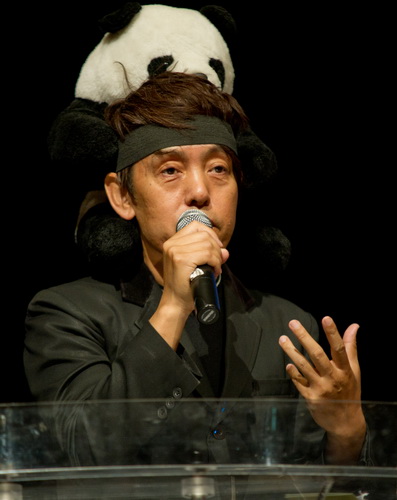
International School of Beijing’s (ISB) high school has assemblies in the theater every Wednesday, a mundane ritual of announcements and speeches where students hang their heads, groggy from sleep withdrawal, but mindful to contort a half-thoughtful countenance for the preying eyes of teachers.
This last Wednesday was a pleasant change from the prosaic past. Director Tim Lies and artistic director Zhang Bandi made a showing to promote their latest movie, Let Panda Fly. The trailer was, in a word, unique. In several words, it was beat up men with eyes like pandas, a boy who wanted to build a robot panda, and Venus de Milo in panda feces. Aimed at children, the artistic movie aimed to capture the importance of working as a community to preserve the rich culture of China, and to prevent one of the defining symbols of our nation from going extinct.
But really, does China even have a cultural identity anymore? Luxury in this country is symbolized exclusively by American “things”: Apple, Harvard, New York, Disneyland. A few years ago, a hutong, a symbol of 200 years of cultural history and richness, was renamed manhadun ( 曼哈顿 i.e. Manhattan), before being torn down by the government. Beijing has a Paris Street, a Windsor Street, and the famous commercial real estate company of Soho borrows its name from a Manhattan district. Even with the government’s stingy stand on foreign direct investment, we see our city as having a culture that is only a scrapbook of other cultures.
Nothing truly is Chinese anymore—teahouses are replaced with McDonalds, all popular television shows are cheap knockoffs of American versions (The Voice, The Bachelor), and the ultimate goal for all Chinese parents is for their child to go overseas. In the trailer of Let Panda Fly, the man was smacked with what looked like a Louis Vuitton, the ‘robot panda’ was described as a Transformer, and it was ultimately Venus de Milo that was made out of panda feces instead of a Terracotta Warrior. A family movie about the preservation of Chinese culture should not, at least in my opinion, be stuffed with Western ideas. It would appear that our country aims to copy not only Western products, but also their cultures.
In this respect, I really wish our country were a tad more like Japan. Every time I see a Chinese knockoff of something American, it only continues to remind me how we view ourselves—as inferior, as sheep to America’s shepherd. I was never sure what I was in China, a native or an expat, but I know what I truly love this (my?) country, and that it hurts me to see where we are today. The problem isn’t that we buy too many foreign products, or watch too much Transformers or Disney, but that we don’t take enough pride in the country we live in.
I remember coming back to school after the summer holidays a few years ago, and the teacher asked us if any of us returned to our home country for the holiday, and whether or not we had to describe China to those back home. I realized that when we portray our country to people overseas, we focus on a very specific category of descriptions: spitting, lack of Facebook and Youtube, pollution. But never do we talk about the remarkable materializations of buildings and streets, the breakneck pace of life and service, and how everything just never seems to stop.
It seems to me that everyone views this city unjustly and with tinted lens, as if we were reviewers who were comparing Beijing to the industry standard that America has set. But at the end of the day, we live in what is quite possibly one of the most exciting places in the world right now: the centerpiece of a rising era, a city that is to conquer the world.
To me, these steadfast buildings and contorted streets, this home that moves us all, and its indefatigable people, 20 million tireless cogs that meld to construct this grand machine—that’s something to be proud of.
Photo courtesy Hal Jin
Hal Jin, 16, is a student at ISB. Born in Nanjing, Jin lived in Vancouver until the 5th grade, when he moved to Beijing. The Editor-in-Chief of ISB’s school newspaper, Jin is also a captain of the Forensics team, the chair of a charity group, and an advisor for the middle school math team.
The beijingkids student correspondent program gives high school students with an interest in writing and journalism a resource for guidance, feedback, and real-life training.If you are a student interested in becoming a beijingkids student correspondent, or you know a student who is, please contact ellisfriedman@beijing-kids.com.



